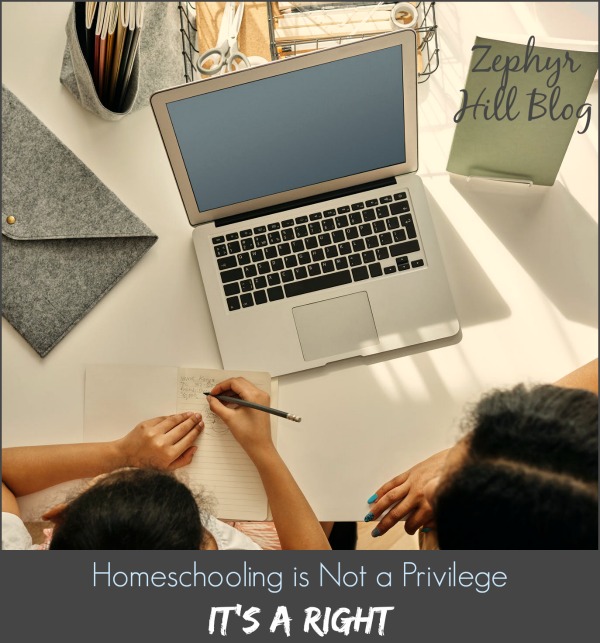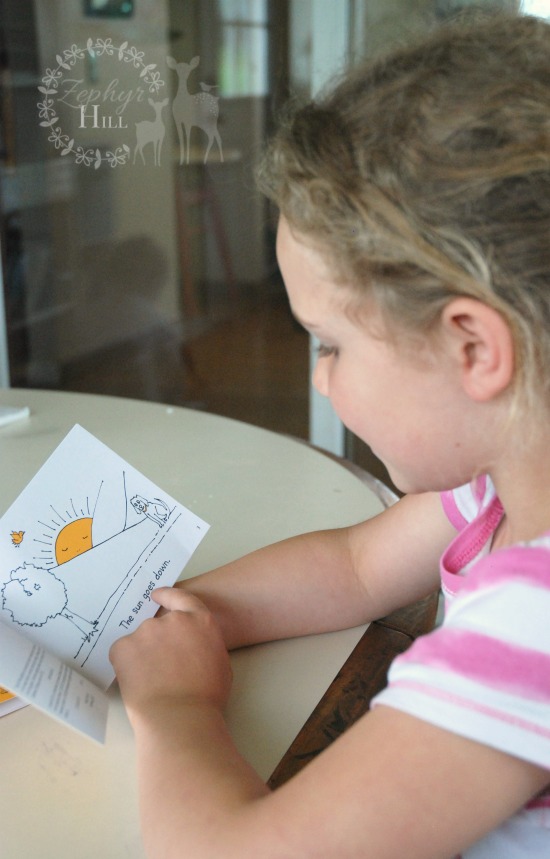
Is homeschooling a privilege, something that’s only really possible for those with extra time, extra income and a certain level of education? Is it only for the elite? Fortunately, the answer is no. Homeschooling is a right. And it’s a right more and more parents are interested in right now.
A recent poll showed 40 percent of parents are more likely to pursue it after the coronavirus lock downs end. It’s really not surprising, given that some schools are going to look and feel more restricted this fall. Additionally, many parents who unexpectedly found themselves homeschooling this year discovered that home learning (despite it’s challenges) can be safer, more personalized, and promote shared values.
There’s a popular misunderstanding that government “grants” us the right to teach our own children, and this leads to the mistaken notion that it’s a privilege which is only bestowed upon a few. This is patently false. The right to homeschool is yours to claim as soon as you become a parent. In fact, we all homeschool because our children start learning from us from the moment they are born. However, the authorities do regulate homeschooling to varying degrees.
That’s all very well, you might say, but being able to homeschool requires access and advantages, so it’s only available to a select few. Homeschooling is something a marginalized or poor family can only dream about. This argument may tug on our heartstrings, but thankfully it has little evidence to back it up.
If you are contending that there will be some challenges and barriers, well then we agree! But as one mother told me “Almost anything is doable, if you want it badly enough.” I love her spirit!
So let’s look at the typical barriers that naysayers say makes homeschooling impossible.
Economics
Money turns out not to be a major brick wall after all. So you can breathe a big sigh of relief!
Interestingly, when faced with failing public schools, many families end up choosing homeschooling because the other choices turn out to be too costly. Marginalized families don’t have the luxury of moving to where the better schools are. Nor can they afford private schooling. Homeschooling becomes “the most inclusive of economic diversity and the most accessible to families who are economically in the middle and less than middle,” to use Paula Fitzgibbon’s words.
For these children, learning at home may be just the thing that helps to “break the shackles of oppression,” to quote Idzie Desmarais.
There’s an educational truism you should never forget. Some of the most important things you teach your children as a homeschool parent have very little to do with money or social status.
An example that springs to mind is Ben Carson, our current Secretary of Housing and Urban Development, and a renowned neurosurgeon. Despite being a single working mother in Detroit, and unable to read or write, Sonya Carson inserted a life-changing kind of homeschooling into young Ben’s world. She started requiring him to read more and turn in book reports to her. Regular reading and writing were the little seeds that jump-started the beginning of a fruitful academic career that led him to Yale University, and beyond.
Even small changes and sacrifices can have a major effect on your child’s academic future.

In summary, it does not cost a lot to homeschool. Many families do it for free, or next to nothing.
- If you have a library card, you can homeschool
- If you have access to the internet, you can homeschool
- If you don’t have access to the internet, you can homeschool
- If one or both parents work, you can homeschool
- If you have access to used books, you can homeschool
Arthur Ashe puts it very simply: “Start where you are. Use what you have. Do what you can.”

Demographics
Only a certain type of family homeschools, right? WRONG.
Many homeschool families don’t fit into the typical demographic. They are poor. They work outside the home. They are single mothers. Their children are disabled, special needs or face a learning disorder. Some don’t even have internet access.. They may have chosen homeschooling not for religious reasons, but for protection against bullies and violence.
Whatever the reason, homeschooling rates have consistently been on the rise over the past few decades, and this is true across different demographics. According to the National Home Education Research Institute, there are 2.5 million homeschoolers in America, and “the home school population is continuing to grow (at an estimated 2 percent to 8 percent per annum over the past few years).”
So if you’re thinking about this proposition in terms of color, creed or ethnicity, you’re thinking about it all wrong. Education is a door that we can all open. Mark Twain once wrote “Keep away from people who try to belittle your ambitions. Small people always do that, but the really great make you feel that you, too, can become great.”
Making good life decisions like staying in school, getting a job, and starting a family are statistically proven paths to success, regardless of demographics. The consequences of derailing from this track are harmful and costly in terms of future outcomes. As an anonymous person once quipped, “If you think education is expensive, try ignorance.”

Educational Background
You can teach your child without a degree. You can teach your child even if you didn’t finish high school. But if either of those propositions still gives you cold shivers, there are other options available like online schooling and local co-ops. You don’t have to do this alone. Here are some real-life support scenarios shared with me by other homeschoolers:
- “My husband and I share teaching duties, depending on our work schedules.”
- “My mom came twice a week to help tutor my oldest in math.”
- “We have used video curriculum, online classes and a co-op. My husband is a science guy and he does the experiments and labs.”
- “We have used free pre-recorded classes to learn things like sign language.”
- “My sister is doing a correspondence course for religion.”
- “We use ALEKS, which is a personalized online learning program, and it’s only $20 a month.”
- “We discovered free classes through our local community colleges, and they even earned some credits early.”
- “The older kids help out the younger ones, and my husband takes a subject when he comes home. Every little bit helps!”
- “We use online programs for Spanish, typing, math and coding.”
- “As a single mother, I worked at places that allowed me to bring my daughter with me. She did school while I did my job.”
- “The free virtual public school option was a lifesaver for us. The local school was failing my daughter. She stays with her grandmother while I’m at work, but in the evenings I go over what she’s learning.”
Frequently remind yourself that the majority of homeschool parents are not highly educated. Yet homeschoolers consistently outperform their peers by nearly every measurable academic standard.
David Burns wrote “Aim for success, not perfection. Never give up your right to be wrong, because then you will lose the ability to learn new things and move forward with your life. Remember that fear always lurks behind perfectionism.”

Change Starts with You
We should all be advocating for better choices and greater access when it comes to education. That means encouraging people to homeschool, if they want, and working to make it easier for them. Far too many Americans limit their educational advocacy to throwing more money at public schools. This one-size-fits-all approach is just not working.
Homeschooling is the chance to make a radical change in your child’s life for the better. I say we should be applauding those who take the plunge. Crying “privilege” shuts down important conversations about expanding access and opportunity. It has been rightly been called the soft bigotry of lowered expectations. It ignores the accomplishments of the “underprivileged” who are homeschooling right now and those who are working to expand access.
Remember who it was that made the phrase “be the change you seek” famous? It was Barack Obama who said “Change will not come if we wait for some other person or some other time. We are the ones we’ve been waiting for. We are the change that we seek.” While I disagree with how the President applied this vision, the sentiment remains true and is highly inspirational, especially when you think about advocating for educational opportunity.
Guess what? Some of this is happening already, with schools allowing homeschooled kids to take part in sports and certain activities. And people are forming local groups to support one another in the adventure that is homeschooling.
Here are some more practical solutions:
- Join or start a homeschool co-op in your area
- Advocate for free access to public school resources for all types of students
- Support school choice initiatives in your area
- Contact your representatives and senators and ask them to expand educational options for all types of students
- Join the HSLDA; they passionately advocate for the freedom to homeschool and offer support all the way
Before I close, there is one privilege I will grant in terms of homeschooling. It’s the privilege that every parent has in receiving the gift of a child from God to teach and nurture.
Now, as enthusiastic as I am about homeschooling / unschooling, I realize we’re not ready for everyone to do it yet. It is my hope that today’s post will wake people up to their rights, and spur them to make these rights more accessible to all.
“Your attitude, not your aptitude, will determine your altitude.”
– Zig Ziglar

I love this! So incredibly true! Every parent has the right to educate their child as best as they see fit. Thank you for sharing this with us!
Anne, these are wonderful points you make. Deciding to homeschool two years ago was the hardest but most fruitful decision my husband and I made for our family.
To add to the quotes you used, here is a quote from Albert Einstein regarding school.
“School failed me, and I failed the school. It bored me. The teachers behaved like Feldwebel (sergeants). I wanted to learn what I wanted to know, but they wanted me to learn for the exam. What I hated most was the competitive system there, and especially sports. Because of this, I wasn’t worth anything, and several times they suggested I leave. This was a Catholic School in Munich. I felt that my thirst for knowledge was being strangled by my teachers; grades were their only measurement. How can a teacher understand youth with such a system?”
— In a conversation with William Hermanns, later published in Einstein and the Poet: In Search of the Cosmic Man, 1983
This is true for most schools these days as both public and private schools try to hit certain numbers on testing so they can receive extra funding.
Right, Emily! And so much of government policy, from the top down, measures success by tests. Education is so much more than that, and involves the whole person! Maybe you can pass a test, but can you think critically? And what about your character development? That quote from Einstein that you shared reminded me of Thomas Edison’s experience in school. I read his bio last year and learned that he was hyperactive and attended public school for just 12 weeks before being pegged as a “difficult” child. His wise mother pulled him from school and taught him from home. He had a voracious appetite for learning and devoured all kinds of books. And then he would spend every cent he earned as a child on materials and chemicals for his experiments. These kinds of stories make me think about how much valuable time is wasted by so many children in this country as they are stuck in a desk being given a one-size-fits-all education. People like Einstein and Edison could not have thrived in that system. ~ Anne Marie
I’ll say one more thing, as a child of Catholic Schools and having two children go through 4th grade in public community schools, it was hard for me to justify taking them out of school because I had known no other way and my kids seemed to be excelling. But as we prayed to become a holy family, Christ was leading our family to homeschool. Seeing your family and several friends homeschool, gave me the courage I needed to step forward. Even then, I needed lots of support! But I wouldn’t do it any different now. For us, it started with a desire to instill the morals we want our children to have. But it’s grown into a freedom to be creative and to build up a study skills and learning tools they can apply as adults. Those will bring them further than trying memorize something g just long enough to pass a test.
I agree, Anne! It’s been so long since we made the decision to homeschool that your article made me think about the process we went through with that! It had never even occured to me until a new friend of mine mentioned it to me as an option as going to school was just the norm. I then started doing my research, and we decided that this would be right for our family and never looked back. It’s been about 10 years ago so I don’t even remember what all went into this decision, but if I were making it today, your points would really have resonated with me and still do! People don’t always realize that it is possible for just about anyone to homeschool their children
Everyone’s journey is different! Thank you for sharing your experience, Janette. I hope more families will avail themselves of this right in cases where other educational options just aren’t cutting it anymore. – Anne Marie
Hi Anne Marie.
So true. Homeschooling is a right related to the duties of parenting. There are no rights without duties. I love Ben Carson’s story. God bless his mother! Your article is a very nice encouragement and introduction to the idea of homeschooling. The basics are so straight forward and even simple.
Most of us can teach what we know using conversation and reading. We can even teach reading and writing with chalk and slate like “we” did in the 1800s. A stick and the sand were the only writing utensils Our Lord is recorded to have used.
The most important thing to remember is that we homeschool for the sake of our children and their getting to Heaven. This is what can keep us going through difficult moments. We’re in good hands with a great precedent when we work and pray to do His will. +
Hi Mary, and thanks for the happy reminder that Jesus learned at home, too! I also appreciate your wonderful website and the resources you are providing to all homeschool families! – Anne Marie
I wouldn’t have it any other way, despite being in college full time, about to go back to work full time, and in the process of infant adoption. My son thrives being homeschooled. We will likely homeschool his sibling(s) as well. We’ve had terrible luck with my son in public school due to him being neurodiverse.
Wow, Cassie, you are my super hero! Being neurodiverse is something I’m not familiar with, so I had to go Google that to learn more. So glad that learning at home has helped your unique child to realize his full potential! – Anne Marie
I have been honored to homeschool my kids. Thank you for an informative read. I have a feeling we are going to see homeschooling continue to rise in the coming years!
Thanks for sharing. I agree that every parent regardless of situation has the right to choose or create the best possible education for their children
I love the flexibility of homeschooling – so many different families can homeschool their children using such a wide variety of materials and resources. If someone wants to homeschool, they really can. There is support and help from not only the homeschooling community but family and friends.
I am so glad I’m able to homeschool. It works out best for our family.
Well said! And something MANY need to read!
“Start where you are. Use what you have. Do what you can.” LOVE THIS!!